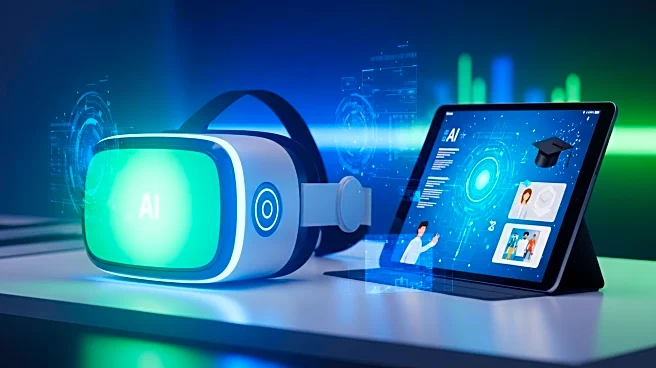What's Happening?
The game-based learning market is experiencing significant growth, driven by companies like Duolingo, Kahoot!, and Skillsoft. These companies are utilizing AI, behavioral science, and gamification to enhance educational experiences and expand their market reach. Duolingo has implemented AI-driven personalization through its Birdbrain algorithm, which tailors lessons to individual learning curves, while Kahoot! has transformed classrooms into competitive arenas, boosting student engagement and test scores. Skillsoft is focusing on AI-powered corporate training, offering personalized learning paths based on employee performance data. The market is projected to grow from $6.23 billion in 2025 to $17.82 billion by 2030, indicating a strong demand for innovative educational solutions.
Why It's Important?
The expansion of the game-based learning market reflects a broader shift towards personalized and engaging educational experiences. This growth has significant implications for the education sector, as it highlights the increasing importance of technology in learning environments. Companies like Duolingo, Kahoot!, and Skillsoft are setting new standards for educational tools, potentially influencing how schools and corporations approach training and development. The integration of AI and gamification in education could lead to improved learning outcomes and increased retention rates, benefiting both students and educators. As the market continues to grow, stakeholders in the education industry may need to adapt to these changes to remain competitive.
What's Next?
As the game-based learning market expands, companies are likely to continue innovating and refining their offerings to meet the evolving needs of educators and learners. Duolingo, Kahoot!, and Skillsoft may explore new technologies, such as augmented reality and virtual reality, to further enhance their educational platforms. Additionally, the demand for personalized learning experiences is expected to drive further investment in AI and data analytics. Educators and institutions may need to evaluate and integrate these tools into their curricula to maximize their benefits. The ongoing growth of this market could also lead to increased collaboration between educational technology companies and traditional educational institutions.
Beyond the Headlines
The rise of game-based learning and AI-driven personalization in education raises important ethical and cultural considerations. As these technologies become more prevalent, questions about data privacy, the role of technology in education, and the potential for unequal access to advanced learning tools may arise. Educators and policymakers will need to address these issues to ensure that the benefits of game-based learning are accessible to all students, regardless of their socioeconomic background. Additionally, the emphasis on gamification and competition in learning environments may influence educational philosophies and teaching methods, prompting discussions about the balance between traditional and technology-driven education.










